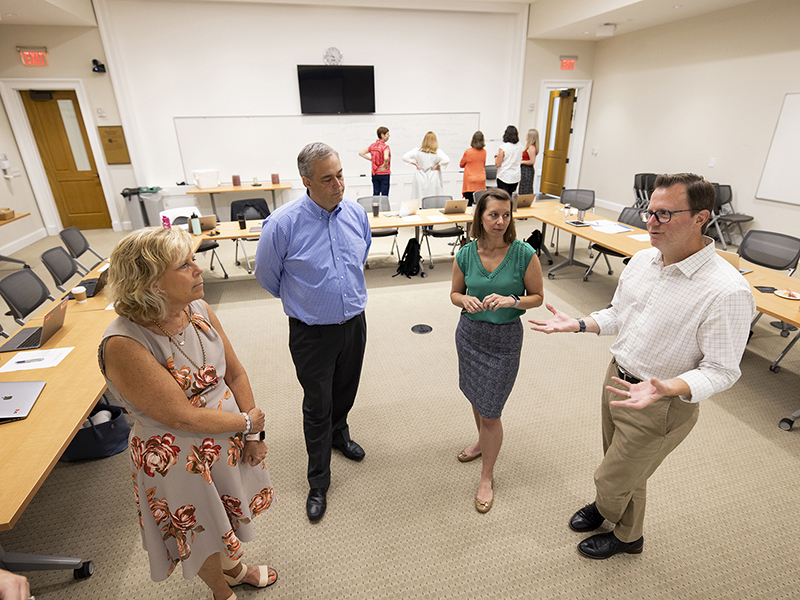Nearly 80 University of Georgia faculty members have used the Active Learning Summer Institute to help them redesign courses that 28,000 students have enrolled in so far.
Building on these milestones to ensure that even more students benefit from active learning techniques is the focus of the quality enhancement plan that is currently in development as part of UGA’s reaffirmation of accreditation.
“UGA has a long history of excellence in undergraduate instruction,” said S. Jack Hu, the university’s senior vice president for academic affairs and provost. “The quality enhancement plan that is currently in development seeks to build on this history to further enhance teaching and learning for students.”
The 2021-2022 academic year marks the university’s next reaffirmation cycle by the Southern Association of Colleges and Schools Commission on Colleges. As part of this process, institutions are required to certify compliance with the commission’s standards and to submit a quality enhancement plan to improve student learning and success.
In January 2020, President Jere W. Morehead charged an 11-member QEP topic selection committee primarily composed of faculty and also including student representation. The group’s charge was to identify an area of focus for the QEP that aligned with the university’s 2025 Strategic Plan and related institutional efforts. Promoting active learning — which is defined broadly as the condition under which students think about what they are learning as they are learning it — was a key recommendation of the university’s 2017 Task Force on Student Learning and Success. Following a review of existing UGA programs and opportunities, the topic selection committee homed in on active learning.
Henry Munneke, the Terry College’s associate dean for undergraduate programs, served as chair of the topic selection committee and now chairs the QEP development and implementation committee.
“Numerous studies have shown that active learning helps students retain, apply and transfer knowledge,” Munneke said. “So our goal for the quality enhancement plan is to strengthen the culture of active learning here at UGA.”
The three-week Active Learning Summer Institute, which stemmed from a recommendation of the task force, serves as a pilot and foundation for the QEP. The summer institute helps faculty redesign their courses to incorporate evidence-based pedagogical techniques that purposefully engage all students in the learning process.
A common misconception about ALSI is that it focuses simply on activities that faculty can add to their courses. In reality, it helps faculty clearly define desired learning outcomes and how those outcomes can be assessed during instruction through activities such as problem solving, in-class group work, or individual writing and reflection. These assessments provide real-time feedback that helps faculty more effectively reach students.
James Johnson, a senior lecturer in finance, directs the Benn Capital Markets Lab in Amos Hall and was a participant in this year’s summer institute. The learning lab is equipped with Bloomberg Professional terminals hosting proprietary market data for finance students.
“I reworked my lead-in to more closely align with my learning objectives and incorporated in-class group exercises beginning the first day of class. All of my classes responded very positively,” Johnson said. “Student participation and the level of engagement were both noticeably up. I have very high hopes for this semester.”
The President’s Office also allocated $1 million in classroom renovation funds based on the task force report. From Park Hall on North Campus to Aderhold Hall on South Campus and in several locations in between, classrooms have been renovated to promote interaction among students and faculty. In Room 331 of the Geography-Geology Building, for example, desks and computers arranged in rows have been replaced with clusters of desks that facilitate group work and make it easier for the instructor to move among the students.
The quality enhancement plan is still in development, but a few themes have already emerged. Rather than instituting a requirement, such as with experiential learning or the First-Year Odyssey Seminar program, the goal of the 2021 QEP is to ensure that students encounter active learning in several of their courses and several times as they progress toward their degrees.
“I am now much more aware of the students’ development level and where they are in their learning,” said Kenneth White, an assistant professor in the College of Family and Consumer Sciences and 2018 ALSI participant.
New programs are being considered to support the development of instructors, to prepare students to apply an active learning approach to their studies, and to modernize classrooms. A rollout of a comprehensive active learning initiative is anticipated for fall 2022.

